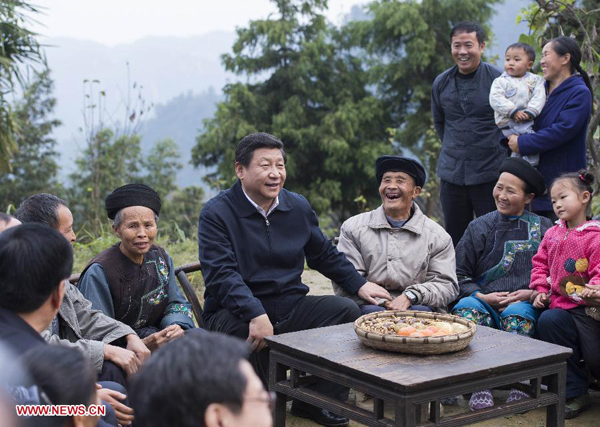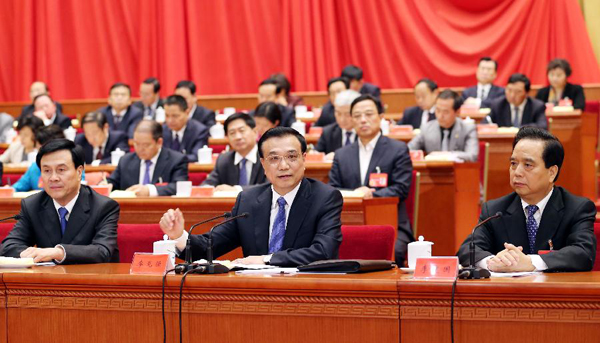Don't underestimate China's resolve to reform
- By Li Jingrong
 0 Comment(s)
0 Comment(s) Print
Print E-mail China.org.cn, November 9, 2013
E-mail China.org.cn, November 9, 2013
The Third Plenary Session of the 18th CPC Central Committee is being held in Beijing from Nov. 9-12. Delegates will discuss a series of important measures to deepen reform, which have captured attention both nationally and worldwide.
The global media have given considerable coverage of the Chinese government's determination to deepen reform and promote innovation.
However, the Reuters, on November 3, cast doubt on the prospects of the much-anticipated reform, saying that China had been used to rapid investment-led expansion for the previous decade.
On Nov. 4-7, Beijing-based newspaper Global Times carried out a telephone survey on people's attitude towards the Third Plenary Session, interviewing people from Beijing, Shanghai, Guangzhou, Chengdu, Xi'an, Changsha and Shenyang. While 63.4 percent of the respondents were interested in the session, some expressed doubts.
In answer to the question "what is the biggest resistance to reform," 45.4 percent of those surveyed said "the central government's policies are often blocked by local governments." Another 30.5 percent said "vested interest groups create obstacles." About 8.5 percent said that "problems in reform concern the overall situation." About 6.0 percent think that " public opinion has a great impact."
Wang Yukai, a professor at the Beijing-based Chinese Academy of Governance, said, "To establish an anti-corruption framework, we must eliminate interference from groups with vested interests. This is the key to distributive justice. We must prevent abuse of power in order to build a fair market. It is important to control government privilege so as to aid political reform."
Former president Hu Jintao's report at the 18th CPC National Congress said that China will achieve its goal of building a moderately prosperous society in all respects by 2020. "We must fully implement the overall plan for promoting economic, political, cultural, social and ecological progress," the report said. "We should carry out the great party building undertaking, while being innovative and driving reform. We should make our party development more scientific."
Hu's report also pointed out that major progress will be made in sustainable and healthy economic development, expanding democracy, strengthening cultural soft power, comprehensively improving living standards, and building an energy-saving and environmentally friendly society.
The "comprehensiveness" is considered the innovative point and highlights of the CPC Central Committee's decision on deepening reform of some major issues, which is to be discussed at the Third Plenary Session.
While meeting foreign delegates attending the 21st Century Council Beijing Conference on Nov. 2, Chinese President Xi Jinping said that although China has achieved remarkable things, it remains the largest developing country. He noted that the country has a long way to go. Solving problems in development and improving the people's livelihoods remain the country's top priorities.
"China is working to transform its development mode and readjust its economic structure," Xi said, highlighting the country's push for industrialization, urbanization, the application of information technology and agricultural modernization.
Xi said China is confident of sustainable and healthy economic growth and it will continue pushing ahead with reform and opening up. "The more China develops, the more it will open up," he said. It is impossible for China to "shut the door that is already open up."
Xi said that a blueprint for comprehensive reform will be put forward at the forthcoming Third Plenary Session of the 18th CPC Central Committee.
|
|
|
Chinese President Xi Jinping (C), also general secretary of the Communist Party of China (CPC) Central Committee and chairman of Central Military Commission, talks with local villagers and cadres at Shibadong Village in Paibi Township of Huayuan County in the Tujia-Miao Autonomous Prefecture of Xiangxi, central China's Hunan Province, Nov. 3, 2013. [Phobo by Wang Ye/Xinhua] |
During an inspection tour in central China's Hunan Province from Nov. 3 to 5, President Xi said that transformation of the economic growth pattern and structural adjustment are hurdles which China has to overcome in its development. "The government at all levels should pursue substantial GDP growth, and strive for efficient, high-quality, sustainable economic development," he said.
On the evening of Nov. 1, Premier Li Keqiang attended the opening ceremony of the 21st Century Council Beijing Conference at the Great Hall of the People, and delivered a speech entitled "China in the Changing World."
Li said that China will always stick to reform and opening-up, continue to enhance the vitality of the market and society, and reform and innovate in various dimensions of the country's development and progress.
China's reform has now entered the deep end, and it will deepen reform, strive to break through deep-rooted obstacles, advance reform on structures, finance and taxation, prices, enterprises and other aspects, and take the initiative to participate in economic globalization. China will insist on opening up further, which will provide more opportunities for international cooperation.
|
|
|
Chinese Premier Li Keqiang (front, C) gives a speech about economic situation at the 16th national congress of the All-China Federation of Trade Unions, in Beijing, capital of China, Oct. 21, 2013. [Xinhua] |
Also on November 1, a television and telephone conference was held in Beijing. Premier Li said at the conference that transformation of government functions and institutional reform is a revolution, "giving priority to the will of the people, sacrificing our own interests for the sake of the public, working painstakingly at difficult tasks without any thought of turning back."
At the Ninth Cross-Strait Economic, Trade and Culture Forum held in Nanning in the Guangxi Zhuang Autonomous Region on Oct. 26, Yu Zhengsheng, chairman of the 12th National Committee of the Chinese People's Political Consultative Conference (CPPCC), said that the forthcoming Third Plenary Session of the 18th CPC Central Committee will focus on deepening reform.
"Reforms this time will be broad and unprecedented," Yu said. "Inevitably, they will transform the economy and society."
The major decisions made by the Third Plenary Session have a direct bearing on China's economy and its people's livelihood. They are expected to guarantee the building of a moderately prosperous society and safeguard the rights and interests of the people. The people are eagerly anticipating its outcomes and will give their wholehearted support to it.








Go to Forum >>0 Comment(s)